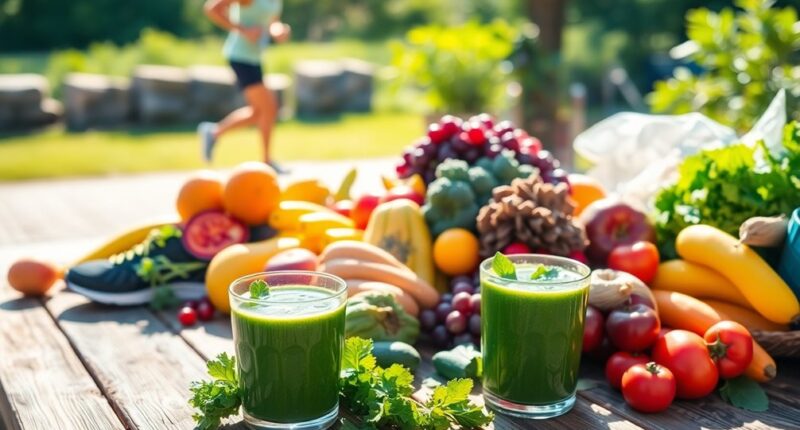A plant-based diet can boost your running performance by enhancing your endurance, speeding up recovery, and providing essential nutrients. You'll enjoy increased carbohydrate intake for energy, anti-inflammatory foods that help with recovery, and rich sources of antioxidants to support your immune function. Plus, it can promote a leaner body composition due to high fiber and lower calories. Want to discover more tips and meal ideas that fuel your runs? There's plenty more to explore!
Key Takeaways
- A plant-based diet is rich in carbohydrates, providing essential fuel for endurance and stamina during runs.
- High antioxidant content from fruits and vegetables aids in recovery and reduces inflammation, enhancing overall performance.
- Consuming iron-rich plant foods with vitamin C boosts iron absorption, supporting energy levels and preventing fatigue.
- Nutrient-dense plant foods promote a leaner body composition, helping runners manage weight effectively.
- Incorporating diverse plant proteins ensures adequate muscle repair and recovery, crucial for ongoing training and performance.
Overview of Plant-Based Diets

When you consider adopting a plant-based diet, it's important to understand the different forms it can take.
Veganism excludes all animal products, while lacto-ovo-vegetarians enjoy dairy and eggs, and pescatarians include fish. Each approach offers unique health benefits and emphasizes the consumption of nutrient-dense foods, which can enhance your athletic performance.
A flexible approach, like flexitarianism, allows for occasional animal products, making it easier to shift while still prioritizing plant-based foods.
This variety not only supports overall health but also aligns with environmental concerns. By choosing any of these diets, you can reap the advantages of a plant-based lifestyle, enjoying delicious meals while making a positive impact on your well-being and the planet.
Nutritional Benefits for Runners
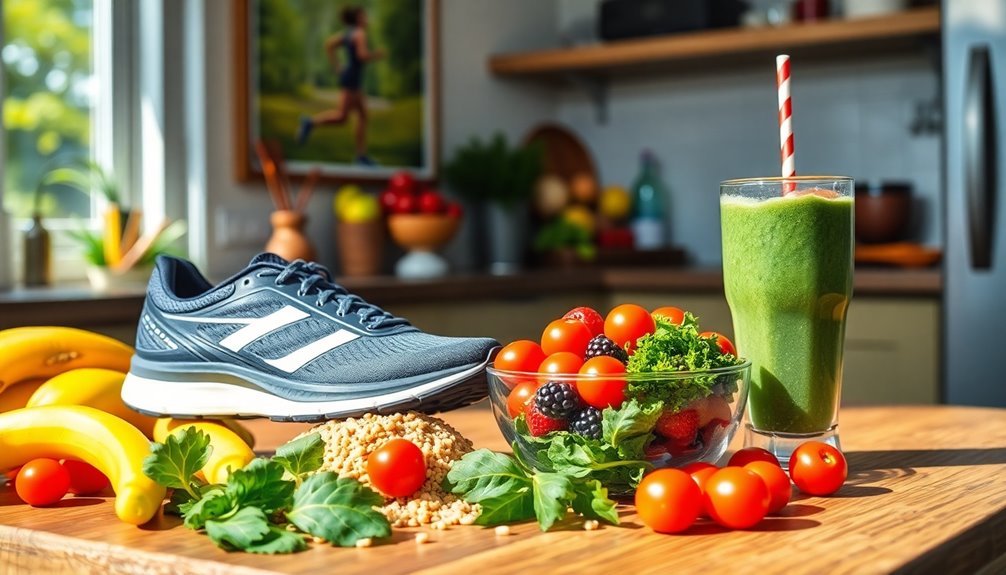
Adopting a plant-based diet offers numerous nutritional benefits that can greatly enhance your running performance.
This diet is typically high in carbohydrates, providing essential fuel for your endurance activities. By incorporating a variety of fruits and vegetables, you increase your intake of antioxidants, which support recovery and overall health.
You'll also benefit from rich micronutrients like vitamins A, C, and E, vital for immune function. Since runners have higher iron needs, including iron-rich plant foods paired with vitamin C can boost non-heme iron absorption.
Plus, a well-planned plant-based diet guarantees you get adequate protein from sources like legumes, nuts, and whole grains, fundamental for muscle repair after your runs.
Embrace the power of plants for peak performance!
Enhanced Recovery Through Reduced Inflammation
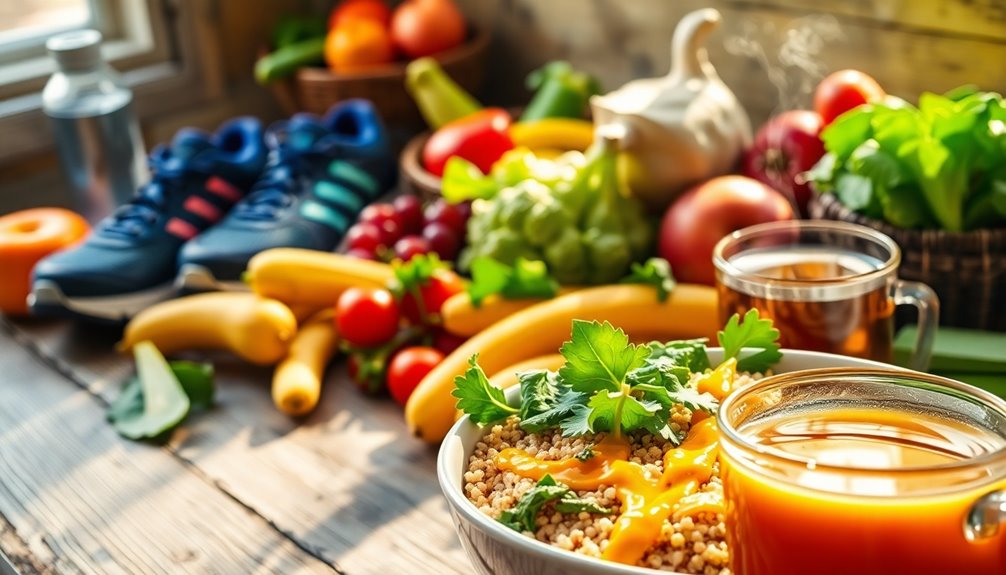
When you switch to a plant-based diet, you're likely to notice reduced inflammation, which can enhance your recovery after runs.
Incorporating anti-inflammatory foods like tart cherries and blueberries helps speed up your recovery process and supports overall joint health.
Plus, timing your nutrient intake with fruits post-exercise can maximize these benefits, keeping you on track for your training goals.
Anti-Inflammatory Foods Benefits
While intense physical activity can lead to inflammation, incorporating anti-inflammatory foods into your diet can greatly enhance your recovery.
A plant-based diet rich in antioxidants, like tart cherries and blueberries, helps reduce inflammation and combat oxidative stress, improving your recovery times. Research shows that these anti-inflammatory foods lower markers of inflammation, making them essential for runners.
The high fiber content of plant foods not only promotes digestive health but also supports overall lower inflammation levels. By including a variety of colorful fruits and vegetables, you provide your body with essential vitamins, minerals, and phytochemicals that work together to boost recovery. Additionally, baked kale is an excellent option due to its high fiber content and abundance of vitamins A, C, and K.
Embracing these foods can make a significant difference in your performance and overall health.
Post-Exercise Recovery Strategies
To enhance your post-exercise recovery, focusing on reducing inflammation can make all the difference. Incorporating antioxidant-rich foods like tart cherries and blueberries into your diet markedly lowers inflammation markers, helping you recover faster.
Research shows that plant-based diets effectively reduce acute inflammation responses, which is essential after intense workouts. Consuming fruits high in antioxidants combats oxidative stress and reduces muscle soreness, allowing you to bounce back quicker.
Additionally, a diet rich in whole plant foods lowers blood viscosity, improving blood flow and nutrient delivery to your muscles. This is critical for peak performance.
Plus, increased glycogen storage guarantees you have enough energy for your next training session, keeping you on track with your running goals. Furthermore, including chia seeds' high antioxidants in your meals can significantly support your recovery process by reducing inflammation and enhancing muscle repair.
Nutrient Timing Importance
Nutrient timing plays an essential role in enhancing recovery, especially for runners focused on reducing inflammation. Consuming antioxidant-rich foods like berries and tart cherries immediately after your workout can greatly lower inflammation markers, speeding up your recovery.
A plant-based diet, with its high carbohydrate content, helps replenish glycogen stores, which is vital for muscle recovery and reducing soreness. Additionally, nutrients such as vitamin C improve iron absorption, essential for replenishing iron levels after intense training. Furthermore, incorporating chia seeds' soluble fiber can further support digestive health and enhance nutrient absorption post-exercise.
Improved Glycogen Storage for Endurance
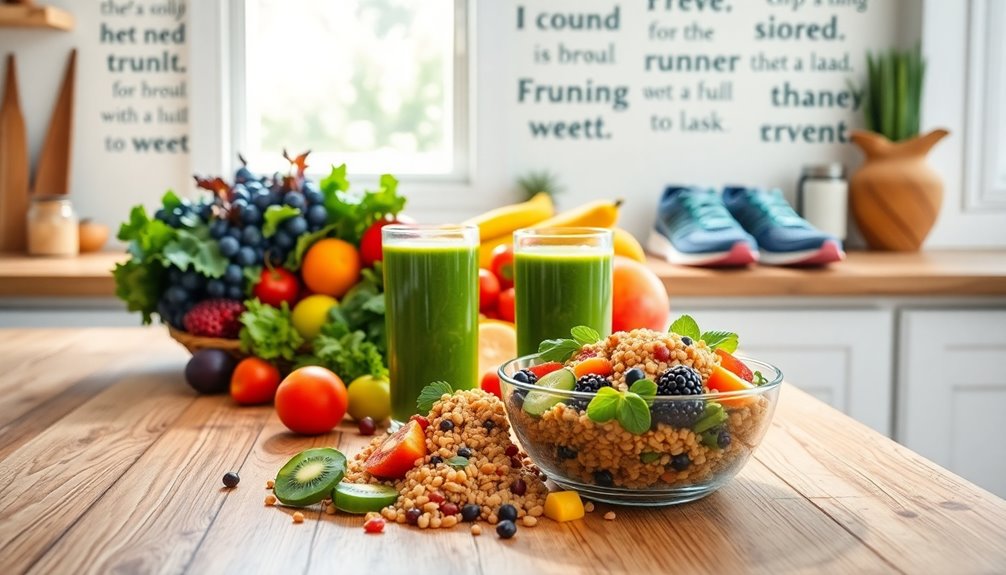
When you adopt a plant-based diet, you'll likely notice improved glycogen storage, which is fundamental for endurance running. This diet is rich in carbohydrates from whole grains, fruits, and legumes, all essential for replenishing glycogen stores.
Adequate carbohydrate intake helps maximize glycogen storage, delaying fatigue during your runs. Many endurance athletes struggle to meet recommended carbohydrate levels, leading to chronic underfueling and decreased performance.
Research shows that plant-based diets enhance glycogen synthesis, critical for enhancing endurance performance. To support ideal glycogen recovery, consume carbohydrate-rich post-exercise foods like bananas or sweet potatoes. Additionally, incorporating beet juice into your diet may further improve blood flow and enhance exercise performance.
Better Blood Flow and Oxygenation

Adopting a plant-based diet can markedly lower your blood viscosity, leading to improved blood flow during your runs.
By replacing animal fats with healthy plant fats from sources like nuts and avocados, you enhance your arterial flexibility, which is key for vascular health.
This combination not only boosts oxygen delivery to your muscles but also supports your overall endurance performance.
Lower Blood Viscosity
A plant-based diet greatly lowers blood viscosity, which means better blood flow and oxygen delivery to your muscles during endurance activities.
By reducing blood viscosity, you enhance blood flow, allowing for improved oxygen delivery to your working muscles.
Studies show that vegetarians tend to have considerably lower blood viscosity levels compared to those consuming animal products.
This reduction helps minimize cardiovascular strain, making it particularly beneficial for runners in long-distance events.
With lower blood viscosity, your body can efficiently transport oxygen, leading to improved athletic performance and quicker recovery post-exercise.
Adopting a plant-based diet not only supports your vascular health but also enhances your overall running experience, helping you achieve your fitness goals.
Enhanced Arterial Flexibility
Lowering blood viscosity is just one benefit of a plant-based diet; it also enhances arterial flexibility, which plays an important role in better blood flow and oxygenation.
By avoiding animal fats, you improve vascular health, allowing your arteries to expand and contract more effectively. This arterial flexibility guarantees that oxygen-rich blood reaches your muscles during runs, supporting improved oxygenation and overall endurance performance.
Whole plant fats, such as those from nuts and avocados, further contribute to this effect by reducing inflammation and promoting better arterial function.
Additionally, the phytochemicals and antioxidants in fruits and vegetables help maintain vascular health, vital for peak running performance and recovery.
Embracing a plant-based diet can truly elevate your running game.
Leaner Body Composition

When you embrace a plant-based diet, you're likely to notice a shift toward a leaner body composition. This diet typically has lower caloric intake while boasting high nutrient density, promoting weight management effectively.
By focusing on whole foods, you're consuming options that are less calorie-dense yet rich in vitamins, minerals, and antioxidants, supporting a healthy weight. The high fiber content in plant-based foods increases satiety, helping you feel fuller for longer and reducing the chances of overeating.
Additionally, research indicates that low-fat vegan diets can enhance post-meal energy expenditure, further contributing to a lean physique. Combining this dietary approach with regular physical activity can lead to improvements in body mass index (BMI) and overall body fat percentage.
Addressing Potential Nutritional Deficiencies
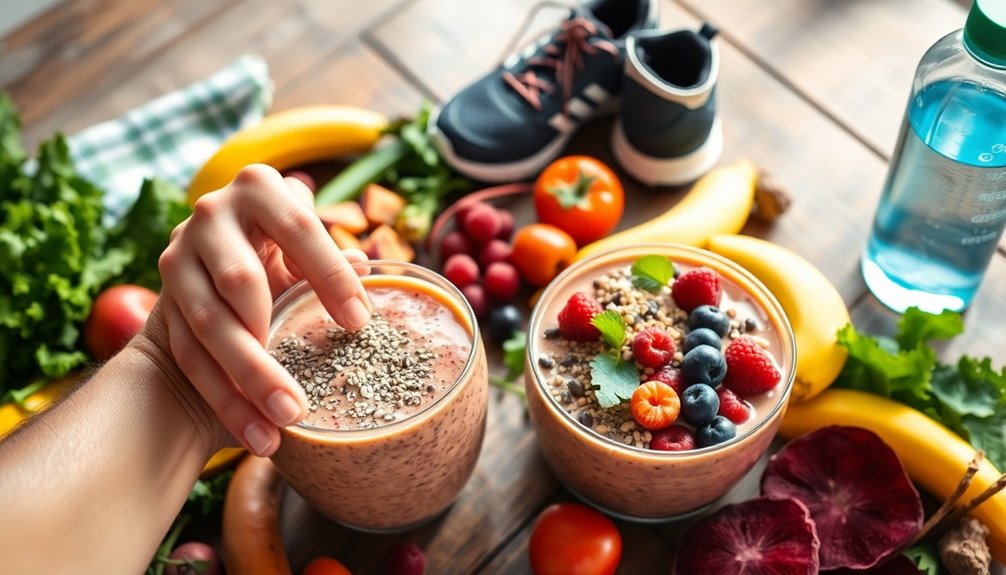
While embracing a plant-based diet can lead to a leaner body composition, it also raises concerns about potential nutritional deficiencies.
To guarantee you're getting the nutrients you need, pay attention to the following:
- Iron: Aim for 18 mg daily; pair with vitamin C for better absorption.
- Vitamin B12: Essential for energy levels and metabolic function; supplementation is vital for vegans.
- Vitamin D: Important for calcium absorption and bone health; consider fortified foods or sun exposure.
- Deficiencies: Regularly monitor for signs of fatigue or weakness.
- Blood testing: Check levels of iron, vitamin B12, and vitamin D to catch deficiencies early.
Additionally, be mindful of essential oil safety when using oils for relaxation or recovery, as they can interact with your overall health.
Staying proactive about these nutrients will help optimize your performance and overall health on a plant-based diet.
Practical Tips for Transitioning to a Plant-Based Diet
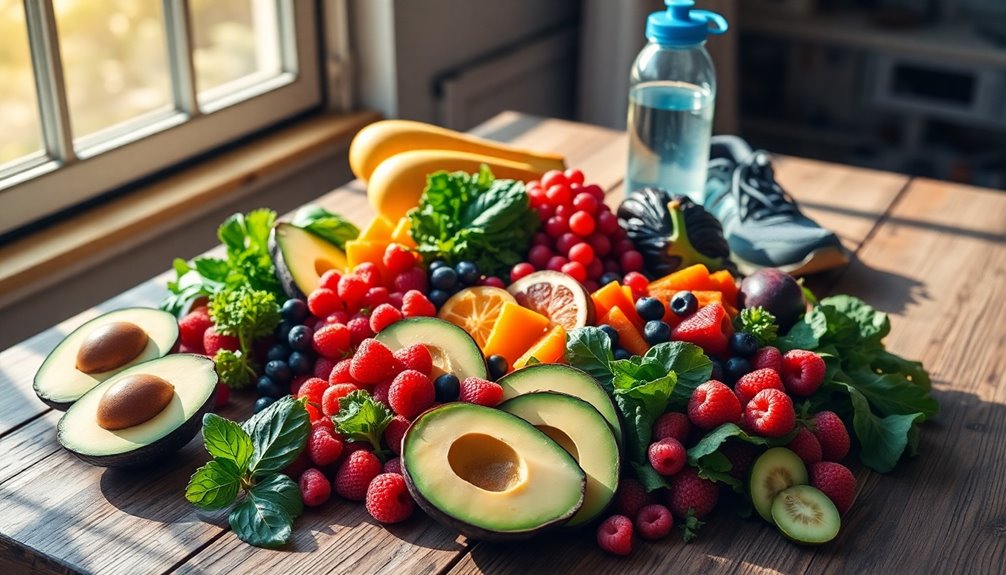
Shifting to a plant-based diet can be an exciting journey, especially when you approach it with an open mind and a plan. Start by gradually incorporating plant-based meals, like Meatless Mondays, to ease into the change.
Focus on a diverse range of foods, including legumes, whole grains, nuts, and seeds, to guarantee you get essential nutrients for your energy needs. Educate yourself about potential deficiencies, particularly vitamin B12, iron, and omega-3 fatty acids, and consider supplementation if necessary. Incorporating foods rich in omega-3 fatty acids can significantly enhance your overall health and performance.
Experiment with cooking techniques to create delicious meals that keep you motivated. When dining out or attending events, proactively seek plant-based options or bring your own dishes, making maneuvering social situations easier while staying true to your dietary choices.
Sample Meal Plan for Plant-Based Runners
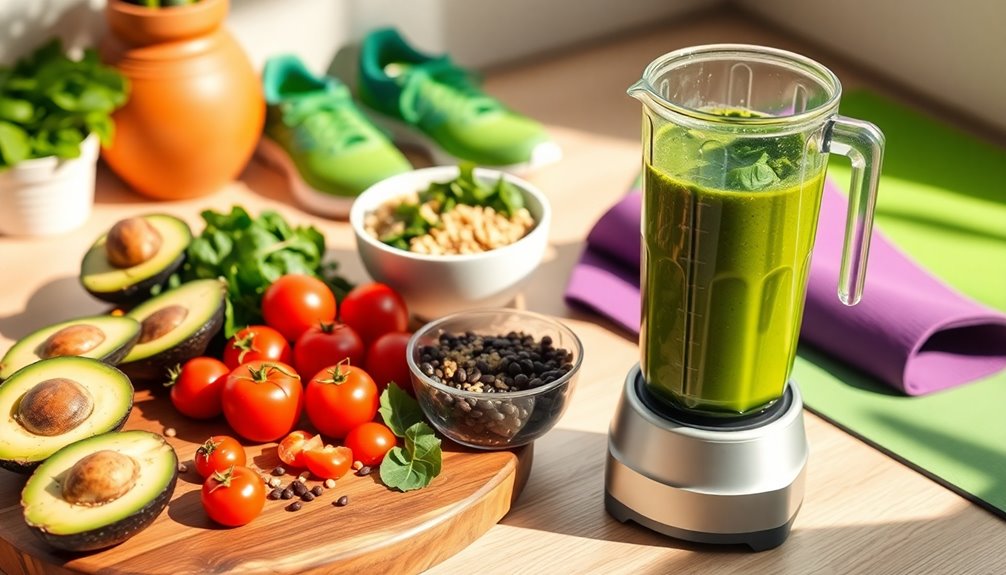
When planning your meals as a plant-based runner, it's essential to focus on a balanced macronutrient intake.
Incorporating nutrient-dense snack options will keep your energy levels steady and support your training.
Let's explore a sample meal plan that meets these needs effectively.
Balanced Macronutrient Intake
A balanced macronutrient intake is essential for plant-based runners to fuel their bodies effectively and enhance performance.
To meet your protein requirements and carbohydrate needs, focus on incorporating a variety of whole grains, legumes, nuts, and seeds into your diet.
Here's a quick guide to help you:
- Start your day with oatmeal topped with berries and chia seeds.
- Enjoy a quinoa salad with chickpeas and avocado for lunch.
- Snack on apple slices with almond butter or energy balls made from dates and nuts.
- For dinner, consider lentil soup with whole grain bread or sweet potato and black bean tacos.
Don't forget to hydrate and listen to your body's needs! Additionally, including nutritional deficiencies in your diet can help ensure you're getting all the essential vitamins and minerals necessary for optimal performance.
Following this meal plan can help you thrive on a plant-based diet.
Nutrient-Dense Snack Options
Nutrient-dense snacks are essential for plant-based runners looking to maintain energy levels and support recovery. Incorporating a variety of snacks can help you meet your nutritional needs while fueling your runs.
| Snack Option | Benefits |
|---|---|
| Energy Balls (dates, nuts, seeds) | Quick energy and essential nutrients |
| Whole Grain Rice Cakes | Healthy fats and carbohydrates |
| Smoothie (spinach, banana, protein) | Excellent post-workout snack |
Try pairing fresh fruit like bananas or apples with almond butter for a boost of carbohydrates and healthy fats. Edamame and carrot sticks make for a protein-rich option, aiding muscle repair. By choosing these nutrient-dense snacks, you'll support your performance and recovery on your plant-based diet.
Success Stories of Vegan Runners

What if changing your diet could elevate your running performance? Many runners, like Scott Jurek and Rich Roll, have thrived on a vegan diet, showcasing incredible success.
Here are some key takeaways from their journeys:
- Performance benefits through a plant-based diet
- Enhanced cardiovascular health for better endurance
- Reduced exercise-induced inflammation
- Rapid recovery thanks to nutrient-dense foods
- Increased energy levels and stamina
Both Jurek and Roll have set records and transformed their health, proving that a vegan diet can lead to remarkable improvements in running.
A study in Nutrients supports this, highlighting how elite plant-based athletes enjoy better glycogen storage and overall performance. Furthermore, incorporating whole, unprocessed foods into their diet has likely contributed to their success.
Consider their stories as inspiration for your own running journey!
Frequently Asked Questions
Why Is a Vegan Diet Good for Runners?
A vegan diet's great for runners because it fuels your body with essential nutrients.
You'll find antioxidants in fruits and veggies that help reduce inflammation and speed up recovery.
Plus, the high carbohydrate content keeps your glycogen stores full, preventing fatigue during those long runs.
With proper planning, you'll also maintain good cardiovascular health, ensuring better blood flow and oxygenation, which can enhance your overall performance and energy levels on the track.
Does a Plant-Based Diet Improve Athletic Performance?
Imagine fueling your body with nature's finest, vibrant and nourishing foods. A plant-based diet can indeed improve athletic performance.
It boosts cardiovascular health, enhances recovery, and helps you store glycogen more efficiently, keeping fatigue at bay. With lower blood viscosity, your circulation improves, delivering oxygen like a well-tuned engine.
Plus, the nutrient-dense, low-calorie options help you maintain lean body mass. By choosing plants, you're setting the stage for peak performance.
Which Diet Is Best for Runners?
When considering which diet's best for runners, you should focus on one that fuels your body effectively.
A balanced diet rich in whole foods, including carbohydrates, proteins, and healthy fats, is vital. You might find that a plant-based diet offers numerous benefits, but it's important to make certain you're meeting all your nutritional needs.
Experiment with different foods, listen to your body, and determine what helps you feel energized and perform at your best.
Is Veganism Healthy in the Long Run?
Yes, veganism can be healthy in the long run, but it requires careful planning.
You need to guarantee you're getting enough essential nutrients like protein, iron, vitamin B12, and omega-3 fatty acids, which can be less available in plant sources.
Monitoring your nutrient levels through regular blood tests is vital to avoid deficiencies.
Focus on whole, nutrient-dense foods instead of heavily processed options to maintain peak health and well-being over time.
Conclusion
Switching to a plant-based diet can transform your running game. Did you know that a study found plant-based athletes can experience up to 20% less inflammation after intense workouts? Imagine how much better your body could feel, leading to improved performance and quicker recovery. By embracing a plant-based lifestyle, not only will you fuel your runs with ideal nutrition, but you'll also contribute to a healthier planet. So why not give it a try? Your body—and the Earth—will thank you!
